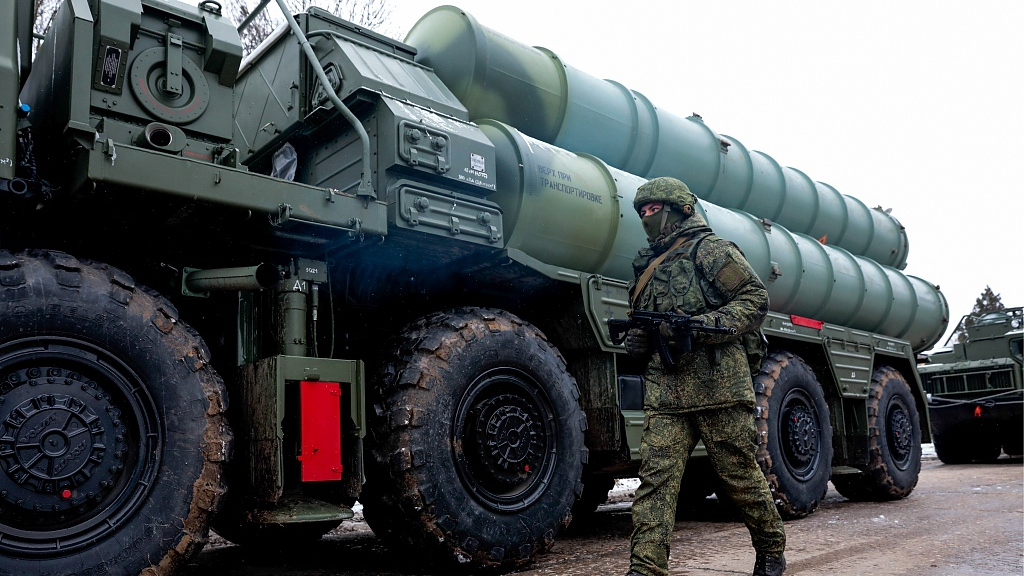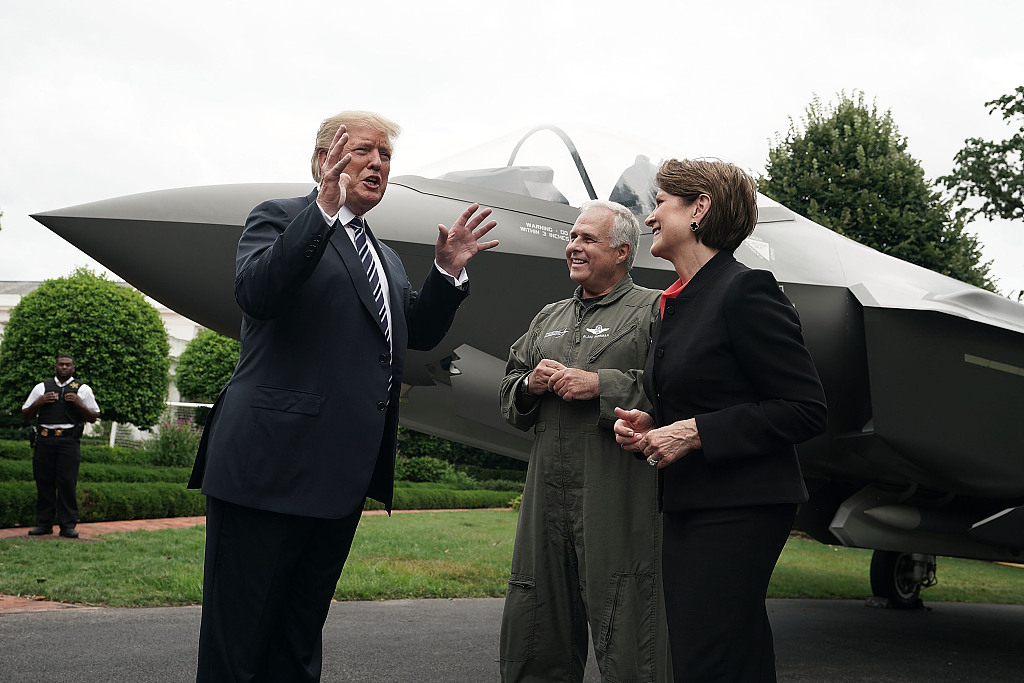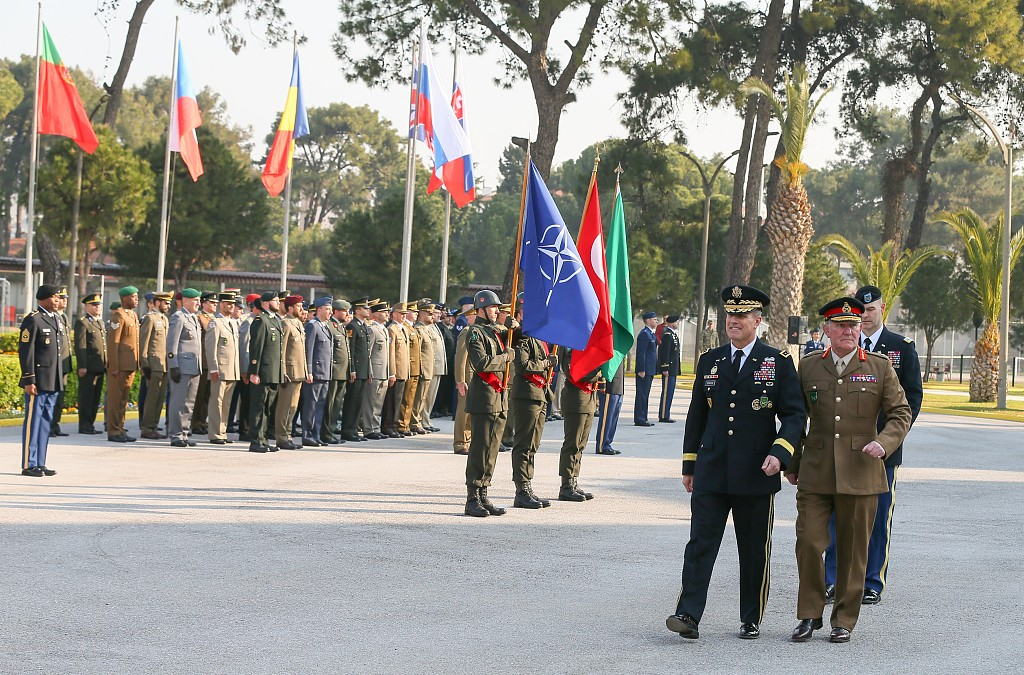
World
17:39, 05-May-2019
Turkey: Won't bow to U.S. sanctions over S-400 deal
Updated
19:26, 05-May-2019
CGTN

Turkey will never bow to U.S. sanctions over its agreement to purchase Russian S-400 surface-to-air missile defense systems, Vice President Fuat Oktay said on Sunday regarding a deal that has strained ties between the NATO allies.
Washington says the systems are not compatible with NATO equipment and may compromise its Lockheed Martin F-35 fighter jets. It has warned of possible U.S. sanctions if Ankara pushes on with the Russian deal.
Turkey, a prospective buyer and a partner in the production of the F-35s, has said the S-400s and jets would not impact each other and that it will not abandon its deal with Russia.

U.S. President Donald Trump talks to Chairman, President and CEO of Lockheed Martin Marillyn Hewson (R) and Director and Chief Test Pilot Alan Norman (2nd L) in front of an F-35 fighter jet at the White House in Washington, DC., July 23, 2018. /VCG Photo
U.S. President Donald Trump talks to Chairman, President and CEO of Lockheed Martin Marillyn Hewson (R) and Director and Chief Test Pilot Alan Norman (2nd L) in front of an F-35 fighter jet at the White House in Washington, DC., July 23, 2018. /VCG Photo
It has proposed forming a working group with Washington to assess the impact of the S-400s but says it has not received a response yet.
Speaking to broadcaster Kanal 7, Oktay said the U.S. concerns are unreasonable and that the planned July delivery date for the S-400s remained unchanged.
"When Turkey signs an agreement, Turkey keeps its promise. We signed this agreement, and certain payments were made," Oktay said. "I don't think the arguments and concerns here have a lot to lean on," he said.
The United States has also offered to sell Turkey its rival Raytheon Co. Patriot defense systems, which Turkey's Defense Minister Hulusi Akar said Ankara was still evaluating.
NATO Secretary-General Jens Stoltenberg, who will visit Turkey next week, told Turkey's state-run Anadolu news agency on Sunday that decisions about defense procurement were up to individual countries.
"The issue of procuring military materiel is a national decision for countries, but the ability of allied armies to work together is a fundamental issue for NATO to run its operations and missions," Stoltenberg was quoted as saying.

Commander of NATO's Allied Land Command (LANDCOM) Lieutenant General John C. Thomson (2nd R) and Lieutenant General Richard Cripwell (R) attend a ceremony marking the 70th anniversary of NATO at the NATO Allied Land Command Headquarters in Izmir, Turkey, April 4, 2019. /VCG Photo
Commander of NATO's Allied Land Command (LANDCOM) Lieutenant General John C. Thomson (2nd R) and Lieutenant General Richard Cripwell (R) attend a ceremony marking the 70th anniversary of NATO at the NATO Allied Land Command Headquarters in Izmir, Turkey, April 4, 2019. /VCG Photo
He said he welcomed talks between Ankara and Washington on the procurement of the Patriot systems and talks between Turkey and the Franco-Italian EUROSAM consortium on its SAMP-T systems.
In March Reuters reported Washington was exploring whether it could remove Turkey from the production of the F-35 stealth fighter jet, angered by Ankara's refusal to back down from its planned purchase of the Russian missile systems.
President Tayyip Erdogan said on Tuesday that the F-35 project would collapse if Turkey did not participate.
Turkey has said it expected U.S. President Donald Trump to use a waiver to protect it against penalties over the S-400s, after U.S. Secretary of State Mike Pompeo said Ankara could face retribution for the deal under the U.S. Countering America's Adversaries Through Sanctions Act (CAATSA).
(Top image: A serviceman of an S-400 Triumf missile system crew passes by as an anti-aircraft military unit of the Russian Air Force and the Russian Southern Military District enters combat duty near the Crimean town of Dzhankoy, 12 miles away from the Ukrainian border, November 29, 2018. /VCG Photo)
Source(s): Reuters

SITEMAP
Copyright © 2018 CGTN. Beijing ICP prepared NO.16065310-3
Copyright © 2018 CGTN. Beijing ICP prepared NO.16065310-3